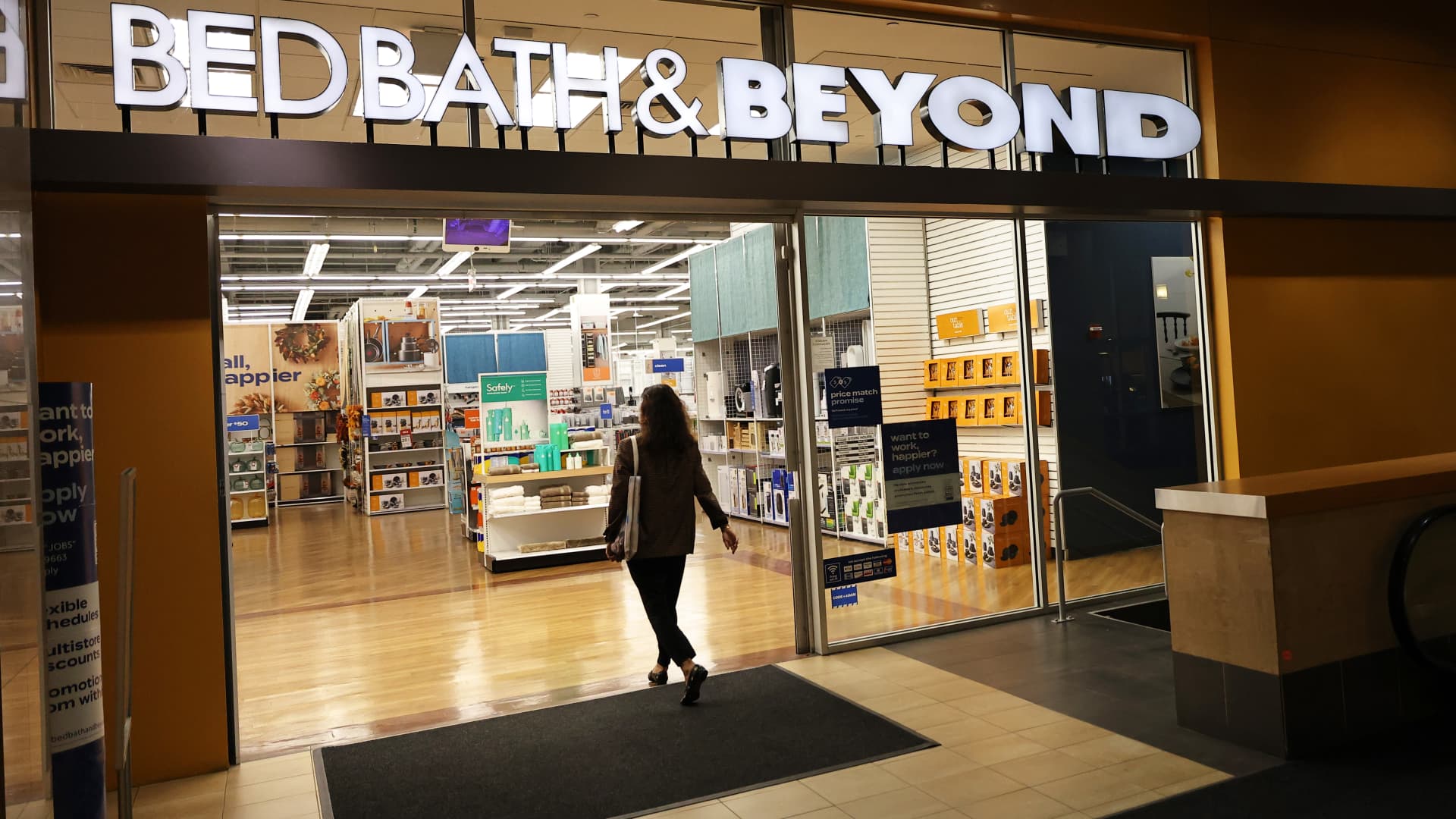
A person enters a Bed Bath & Beyond store on October 01, 2021 in the Tribeca neighborhood in New York City.
Michael M. Santiago | Getty Images
Bed Bath & Beyond is axing one of its private labels, Wild Sage, about a year after the company made an aggressive push into exclusive brands, at the time touted as a linchpin of its turnaround strategy.
A spokeswoman for the home goods retailer confirmed the brand is being discontinued.
The move is likely just the start of bigger changes for Bed Bath and its merchandising approach as it tries to reverse declining sales, appease activist investors and win back shoppers. The retailer has run into inventory and supply chain problems, initially missing out on hundreds of millions of dollars of sales due to out-of-stock items and, more recently, a glut of unwanted products lingering in warehouses and on store shelves.
Bed Bath is also looking for a new leader, after the board announced in late June that CEO Mark Tritton and Chief Merchandising Officer Joe Hartsig had left the company. Its chief accounting officer also departed in June.
In a company statement, Bed Bath & Beyond said private labels — which it calls “owned brands” — “have a place in our assortment.”
“Customer response has been positive, and we are very pleased with the strength of several owned brands, such as Simply Essential, which delivers opening price points,” the company said. “At the same time, we recognize our customers want a better balance of owned and national brands, and are making necessary changes to the assortment to improve the customer experience and drive sales and traffic.”
Bed Bath said it will provide more updates to its strategy this month. Its spokeswoman did not say whether the company is considering phasing out other private brands.
Private labels became a central piece of Tritton’s vision and a dominant part of Bed Bath’s stores. Tritton, a Target veteran, joined Bed Bath in 2019 and rolled out a playbook similar to the one used by the cheap chic retailer. He oversaw the decluttering of stores and the debut of lines of bedding, kitchen supplies and more that couldn’t be found anywhere else.
Bed Bath launched nine private labels starting in spring 2021. One was Wild Sage, a brand that the company described as “stylish, eclectic, free-spirited bedding, decor, furniture, bath products and table linens created for young adults (and the young at heart).” The first collection launched in June 2021, just in time for back-to-college season.
Yet some shoppers found the new brand names disorienting — and less appealing. Instead of seeing large displays of big-name national brands, they saw displays of bedding, furniture and platterware under a name that they didn’t recognize.
Same-store sales plummeted 27% for the Bed Bath & Beyond banner in the most recent quarter, ended May 28.
Fast change, alienated customers
After the company’s most recent earnings report in late June, board member and interim CEO Sue Gove said the company’s sales results were “not up to our expectations.”
Jason Haas, a retail analyst at Bank of America Securities, said the retailer alienated its customers by moving too quickly. It also phased out its popular 20%-off coupons, a move that it has since reversed.
“If they rolled out those brands at a more measured pace and layered them in [with national brands] and the customer got a little more familiar with seeing them on the shelf, it would have been more successful,” he said.
Plus, he said, Bed Bath wound up compounding Covid pandemic-related supply chain issues. Nearly every retailer coped with congested ports and trucking shortages, but private-label merchandise tends to have longer lead times since it’s produced and shipped from overseas. National brands tend to have merchandise that can get to stores more quickly from U.S. warehouses, Haas said.
On Bed Bath’s website, there are signs of the end of Wild Sage. Its merchandise is available at deep discounts, including a tie-dye robe for $7, marked down from its original price of $35, and a 16-piece terracotta dinnerware set for $16, down from an original $80. Many other Wild Sage items are out of stock after being listed for as much as 90% off.
As Bed Bath pivots to more national brands, though, it may run into a different kind of problem. Vendors may be reluctant to work with the retailer or request advance payments as the company’s coffers quickly dry up.
Bed Bath reported roughly $108 million in cash and equivalents in its fiscal first quarter, down from $1.1 billion a year prior. Its net losses swelled to $358 million from a loss of $51 million in the same period in 2021.
For now, the company is still able to draw on its existing $1 billion asset-based revolving credit facility from JPMorgan Chase, according to a quarterly filing with the Securities and Exchange Commission.
As of May 28, Bed Bath said it had $200 million of borrowings outstanding under the loan.
Still, analysts believe the home goods retailer is going to need to more cash to weather its turnaround.
Bed Bath’s chief financial officer, Gustavo Arnal said in a June conference call that the company still had “sufficient liquidity” with its credit facility, and that it had enlisted consultants from Berkeley Research Group as well as financial advisors to look for additional capital.
“There are avenues that we’re exploring to even increase further our liquidity and navigate through the working capital cycle, particularly in the next two quarters, given the seasonality of our business,” he said on the call.
